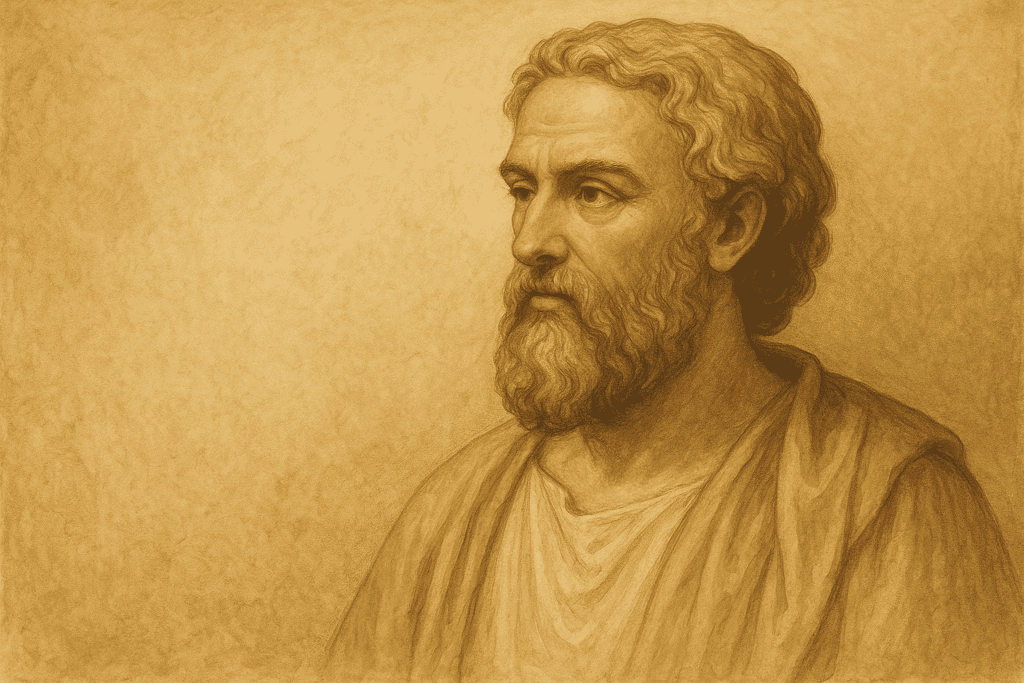

Imagine an Ancient Greek philosopher like Pyrrho, so untouched by this life’s problems that he could even carry on debating during a surgery. Or one who would not even spare a look at a charging dog that ran towards him, trusting his friends to deal with it?
This Greek philosopher existed and his name was Pyrrho of Elis, the man whose radical indifference became the cornerstone of an entire school of thought that has its followers to this day.
Born in the forgotten corner of ancient Elis (western Peloponnese) around 360 BC, Pyrrho’s early life remains a mystery. What is crystal clear, based on later texts by Diogenes Laërtius, is that Pyrrho wasn’t some armchair philosopher. This man actually walked with Alexander the Great on his legendary march to conquer the East, going along with the Macedonian army marching all the way to India.
Think about that for a moment: the dust, the grandeur, the fear and the uncertainty, the sheer scale of it all. It was on this epic trip that Pyrrho encountered the gymnosophists—those famously ascetic, naked Indian philosophers whose profound detachment from worldly concerns must have struck a powerful chord. Can you picture him, amidst the chaos of Alexander’s victorious army, observing these foreign yet wise men who seemed utterly untouched by the world’s noise?
This was probably a scene that stuck with Phyrro for the rest of his life. It must have been a life-altering experience of a radically different way of seeing the world, that affected his philosophy’s essence.

Pyrrho’s philosophy later became known as Pyrrhonism. This philosophical movement is, at its heart, about the ultimate suspension of judgment in one’s life. It obviously didn’t talk about denying that things exist, as some mistakenly assumed while trying to dissect Pyrrhonism. That is far from true. It was about acknowledging that our senses are tricky to be trusted. Additionally, our reason is always limited, and therefore, we can never truly grasp the world’s true nature.
So, if humans can definitively say something is good or bad, true or false, why on earth should people waste their precious energy arguing, stressing out and agonizing over it? That spirit became famous with this folk story of Pyrrho discussing philosophy during surgery, seemingly oblivious to the pain. This scene, either real or forged, captures this radical detachment from the things that people normally spend their lives thinking, fighting, debating and stressing over.
Another similar story about Pyrrho and his talent of detaching from reality is the anecdote of the charging dog, where he just let his friends handle it rather than panicking and running away. These two instances show us that Pyrrho was a man who truly walked the walk. For him, the goal of his philosophy wasn’t to uncover ultimate truths that were hidden from the naked human eye. His goal was to find ataraxia, this Greek notion of deep, unshakable tranquility, a profound inner peace that comes from simply refusing to take a definitive stand on anything. In a world absolutely drowning in strong opinions and absolute certainties, Pyrrho’s approach feels surprisingly refreshing, almost liberating from the polarizing era that we live in.
While Pyrrho’s philosophical approach might have been softer than the bold statements of Plato or Aristotle, his influence proved incredibly persistent exactly because of the nature of his approach. The ideas of Pyrrho were meticulously preserved and expanded upon by skeptics like Sextus Empiricus, whose works are basically our foundation for understanding Pyrrhonism today. And it’s through these intellectual descendants that Pyrrho’s worldviews, his gentle insistence on avoiding judgment, slowly but surely reached our times, shaping how many people act even to this day.
Think of the Enlightenment for example, where questioning everything became a virtue, shattering old dogmas and beliefs and paving the way for scientific breakthroughs that created our modern world. Even now, in our own noisy era, where “fake news” and the endless pursuit of definitive answers often leads to extreme polarization, Pyrrho’s idea offers a remarkably relevant solution.
